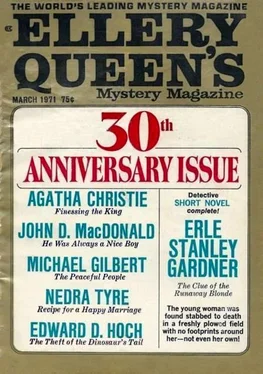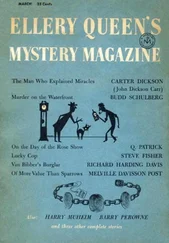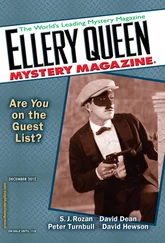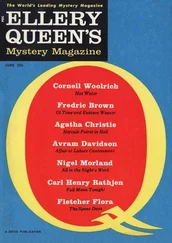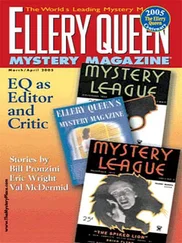Jon Breen - Ellery Queen’s Mystery Magazine, Vol. 57, No. 3. Whole No. 328, March 1971
Здесь есть возможность читать онлайн «Jon Breen - Ellery Queen’s Mystery Magazine, Vol. 57, No. 3. Whole No. 328, March 1971» весь текст электронной книги совершенно бесплатно (целиком полную версию без сокращений). В некоторых случаях можно слушать аудио, скачать через торрент в формате fb2 и присутствует краткое содержание. Город: New York, Год выпуска: 1971, Издательство: Davis Publications, Жанр: Классический детектив, на английском языке. Описание произведения, (предисловие) а так же отзывы посетителей доступны на портале библиотеки ЛибКат.
- Название:Ellery Queen’s Mystery Magazine, Vol. 57, No. 3. Whole No. 328, March 1971
- Автор:
- Издательство:Davis Publications
- Жанр:
- Год:1971
- Город:New York
- ISBN:нет данных
- Рейтинг книги:3 / 5. Голосов: 1
-
Избранное:Добавить в избранное
- Отзывы:
-
Ваша оценка:
- 60
- 1
- 2
- 3
- 4
- 5
Ellery Queen’s Mystery Magazine, Vol. 57, No. 3. Whole No. 328, March 1971: краткое содержание, описание и аннотация
Предлагаем к чтению аннотацию, описание, краткое содержание или предисловие (зависит от того, что написал сам автор книги «Ellery Queen’s Mystery Magazine, Vol. 57, No. 3. Whole No. 328, March 1971»). Если вы не нашли необходимую информацию о книге — напишите в комментариях, мы постараемся отыскать её.
Ellery Queen’s Mystery Magazine, Vol. 57, No. 3. Whole No. 328, March 1971 — читать онлайн бесплатно полную книгу (весь текст) целиком
Ниже представлен текст книги, разбитый по страницам. Система сохранения места последней прочитанной страницы, позволяет с удобством читать онлайн бесплатно книгу «Ellery Queen’s Mystery Magazine, Vol. 57, No. 3. Whole No. 328, March 1971», без необходимости каждый раз заново искать на чём Вы остановились. Поставьте закладку, и сможете в любой момент перейти на страницу, на которой закончили чтение.
Интервал:
Закладка:
“Well, Beckett must inadvertently have stepped right in the murderer’s tracks. That’s the only thing that could have happened. And then you came along and walked in Beckett’s tracks and — well, that’s the only way it could have been. And that blots out the murderer’s tracks.”
The sheriff tilted back his sweat-stained sombrero to scratch the grizzled hair around the back of his head. “Well,” he said, “maybe we can look around a bit, come daylight.”
Quinlan moved away. The sheriff caught Sam Beckett and drew him to one side. “Sam, take everybody out of here on your tractor. Don’t let anybody walk out.” And then he added in a lower voice, “Come back in about an hour and pick me up. Don’t tell anybody I’m staying. Make a couple of trips. Take the body out in the first trip.”
Beckett nodded and Bill Eldon moved away in the darkness, the tip of his cigarette glowing now and again, then dropping to the earth and being extinguished.
Sam Beckett’s tractor moved slowly across the plowed ground to the gate, following the ruts which had now been worn in the soft soil.
The sheriff sat squatting on his heels, cowboy fashion, watching the activity at the gate as parked automobiles roared into noise, headlights splashed on, and tail-lights glowed in sinister blood-red, meteorlike trails.
Slowly the calm of silence descended, broken here and there by little night noises. The field became dark and silent as it had lain for many months while the heirs of old Marvin Higbee squabbled among themselves.
Somewhere behind the sheriff a horse snorted.
Bill Eldon straightened. He turned toward the vague patch of blackness which marked the trees around the old Higbee homestead and walked slowly, the green springy grass muffling his steps. His legs moved with that peculiar high-kneed motion which characterizes the best hunters when they are stalking game. He carefully refrained from using his flashlight.
A few minutes later when the big gloomy house loomed just ahead of the sheriff, the officer loosened his gun in a holster worn shiny with age. He catfooted along the shadow of the trees, found an advantageous place, and once more squatted on his heels, waiting.
An owl boomed suddenly, puncturing the silence with its weird cry. A faint rustling sounded in the dead leaves on the ground over to his right. The sheriff cocked his head slightly to one side, the better to listen to that rustling. Then as the sound became the unmistakable scurrying of some small animal, he turned back toward the house. For some twenty minutes he sat motionless, until the noises made by small nocturnal animals reassured him. Then he straightened to his feet and went forward.
The doors of the big house were closed. The windows had been boarded up. A No Trespassing sign had been nailed to the front of the house.
The sheriff cautiously switched on his flashlight as he inspected the front door and then moved around to the back door. Both doors were closed and locked.
A side door on the east caught the sheriff’s eye. There were spider webs on the side of that door which had been freshly broken.
The sheriff turned the knob.
The door creaked open, rusty hinges squawking at his intrusion.
Stale, musty air assailed Bill Eldon’s nostrils. His flashlight illuminated a small hallway thick with dust and hung with spider webs.
The sheriff pushed across the hallway and entered what had at one time been the living room. A rat, caught in the beam of his flashlight, gave a frightened squeak and scurried for shelter.
Old Marvin Higbee had died over a year ago. Since then the heirs had been engaged in such bitter quarreling that none of them had ever lived in the house or tried to keep it up. Now the living room presented a weird sight. Rats were nesting in the upholstery of the davenport, while spiders were entrenched in webs spun from chandeliers. The floors were thick with dust, and the pictures on the walls hung at crazy angles.
During his lifetime Higbee had been chairman of the board of one of the local banks and had amassed a comfortable fortune as a highly successful contractor. The Higbee place had been the scene of much hospitality. A widower, Marvin Higbee had no children. But he left a sister, Carlotta, and two brothers, Oscar and Robert, when he died after a brief illness. His will bequeathed $10,000 to Oscar, $10,000 to Robert, and the balance of the estate to his sister, Carlotta Higbee Lane. When the will was offered for probate, however, Mrs. Kidder, who had been Higbee’s housekeeper, calmly advanced the claim that she was, in reality, Mrs. Marvin Higbee. There had been a common-law marriage, she said. Because she had not been provided for in the will, she maintained that she was entitled to the rights of a wife.
There had followed a period during which dirty linen had been aired in public. The two brothers, Oscar and Robert, contended not only that Mrs. Kidder was an adventuress and a liar, but also that Carlotta had exerted undue influence on Marvin at the time he made his will. The result had been a legal Donnybrook Fair in which the big country home had become a forgotten side issue.
The sheriff stooped to hold his flashlight near the floor. As he did so, the oblique illumination disclosed prints which had theretofore been invisible.
The officer studied the dust-covered carpet carefully. He could make out the prints of a woman’s shoes and those of at least one man. They had walked back and forth, intersecting each other’s paths. They had made a veritable crazy quilt of tracks, seemingly as purposeless as the tracks left by kangaroo rats dancing wildly about in the moonlight.
The old mansion could tell many a tale, the sheriff meditated. Higbee had been a deep one — with women, in politics, and in business. For a while Farnham, the crusader, had been after Higbee’s scalp, claiming collusion on the big school-construction job. Glasco had been trying to get the Gazette to demand an inquiry, but suddenly the whole thing had been dropped. Higbee’s charm, fascinating to women, had seemed to be as effective with his political enemies. And Higbee, big, vital, breezy, had gone on his way until death had intervened. No amount of backslapping, the sheriff reflected, could make death change its mind.
Moving cautiously, the sheriff entered other rooms of the house. Everywhere, when he dropped his flashlight to a lower angle, he found the same pattern of zigzagging, intersecting footprints in the dust.
Dust had been carefully cleaned from a table in the kitchen. On that table the sheriff found waxed paper, bread crumbs, a lipstick, and a hammered silver cigarette case. At one end of the table there was a charred streak some two inches long and bordered with gray ash, which had apparently been made by a burning cigarette.
The sheriff examined the linoleum floor. One burnt match was lying underneath the table, and also on the floor were two cigarette stubs, both of which had been pinched out. One held the telltale red of lipstick.
Eldon picked up the cigarette case and turned it over. He saw that a heart had been engraved on the side, an arrow intersecting the heart. There were two initials on the arrow, R at the feathered end and B over the point of the arrow.
After studying the cigarette case thoughtfully, the sheriff placed it back on the table just as he had found it. Then he turned around and to the accompaniment of squeaking boards and scurrying rodents he left the house as he had entered it. He took care to close the creaking side door behind him.
It was nearly eleven when the Quinlan telephone rang stridently, insistently.
Beryl threw a robe around her shoulders and ran from her bedroom. “I’ll get it, Mother,” she called as she passed her mother’s door.
Читать дальшеИнтервал:
Закладка:
Похожие книги на «Ellery Queen’s Mystery Magazine, Vol. 57, No. 3. Whole No. 328, March 1971»
Представляем Вашему вниманию похожие книги на «Ellery Queen’s Mystery Magazine, Vol. 57, No. 3. Whole No. 328, March 1971» списком для выбора. Мы отобрали схожую по названию и смыслу литературу в надежде предоставить читателям больше вариантов отыскать новые, интересные, ещё непрочитанные произведения.
Обсуждение, отзывы о книге «Ellery Queen’s Mystery Magazine, Vol. 57, No. 3. Whole No. 328, March 1971» и просто собственные мнения читателей. Оставьте ваши комментарии, напишите, что Вы думаете о произведении, его смысле или главных героях. Укажите что конкретно понравилось, а что нет, и почему Вы так считаете.
